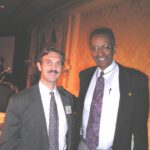Walter Williams and Our Prosperous Techno-Future
by Edward Hudgins
To those who argue we should aim in our economic choices to help future generations, economist Walter Williams would respond, “What have future generations ever done for me?”
This African-American, former chair of the George Mason University Economics Department passed away recently at age 84. His intelligence and wit will be much missed by those of us who knew him. But his insights are relevant for all of us working to usher in our exponential technology age of prosperity for ourselves today; for you see, our work will, in fact, create prosperity for future generations as well.

Seeking a path to prosperity. Williams’s life was a true American success story. He grew up in the impoverished projects of Philadelphia, with no father in the home but with a loving, supportive mother. As a teen he worked odd jobs to make money—against the laws that forbade underaged kids to work. He was drafted into the army—the government “stole my labor,” as he explained—and there he spoke out against racism and unfair treatment of black soldiers.
Williams went on to study economics and saw that a free market offers the only honest path to prosperity for blacks—and all people. In his many books—notably The State Against Blacks—and articles, media appearances, speeches, and classroom, he documented how government regulations and policies prevent minorities from working their way up out of poverty, also trapping them in “spiritual poverty,” a mindset of impotence and hopelessness.
Helping yourself helps the future. So how does his quip about future generations point a path to their prosperity? Williams observed that after he’s dead—sadly, now—some kid born in 2050 will be swinging from the trees he planted on his property and eating their apples, and tracking mud through the beautiful sunroom he had built on his house. In other words, his productive efforts to make his own life better in fact will help future generations as well.
Williams and many economists understood the folly of denying ourselves as a society. Of course, as individuals we make tradeoffs in our spending preferences between what we value more versus less. We save to buy a house, or we forego buying the latest iPhone because we want to pay for our kids to go to a good school.
But what if half the people who really want and can afford an iPhone decide not to buy in order to “help” future generations? To begin with, if future generations have the same attitude, they also will live ascetic lives to “help” the generation after them and so on in a senseless cascade of self-denial. And, of course, if demand for iPhones tanks, there will not be economies of scale and, thus, few iPhones for those future generations that don’t want them anyway because they’re too busy not consuming.
Resources at any given moment might be limited, but in the long run resources are limitless. This is because resources are simply the matter and energy in our universe that we, with our rational and creative minds, discover how to utilize to make our lives better. Rational and creative minds are the commodities we need most of all, especially if we’re to create prosperity for ourselves that will also enrich future generations.
Liberating minds of millions. And it is to this need that Williams’s commentary published on the day he passed away offers us more guidance. In that piece, he documented the disgraceful state of schools in poor, black neighborhoods, where academic results are abysmal, where rational and creative minds are snuffed out. Schools in general are dangerous: “During the 2017-18 school year, there were an estimated 962,300 violent incidents and 476,100 nonviolent incidents in U.S. public schools nationwide. Schools with 1,000 or more students had at least one sworn law enforcement officer. About 90% of those law enforcement officers carry firearms.”
He cites the excellent work by Dr. Thomas Sowell, another African-American economist, showing that so many minority schools in the past turned out far better educated graduates with a fraction of the resources those schools have today.
Rather than several million black lives ruined annually by government mismanaged schools, a prosperous future will require millions of beautiful, curious young minds inspired with hope and educated to help create that future, through AI, robotics, biotech, and nanotech. Now think of the innovative energies of the type of entrepreneurs who have created the techno-ecommerce revolution of recent decades—Steve Jobs, Bill Gates, Jeff Bezos—unleashed to create an education revolution.
A prosperous world with long, healthy lives for all in decades to come will require liberating the millions of minds in the groups left behind by the failed policies in decades past. Walter Williams to his dying day pointed to a free market path to prosperity and human dignity. Let’s create that path!
——-
Edward Hudgins, Ph.D., is founder of the Human Achievement Alliance.
where’s the link to his original article?
Link to his quip is in the first sentence at Williams “would respond…” Hope you enjoy the piece and, more important, Williams!